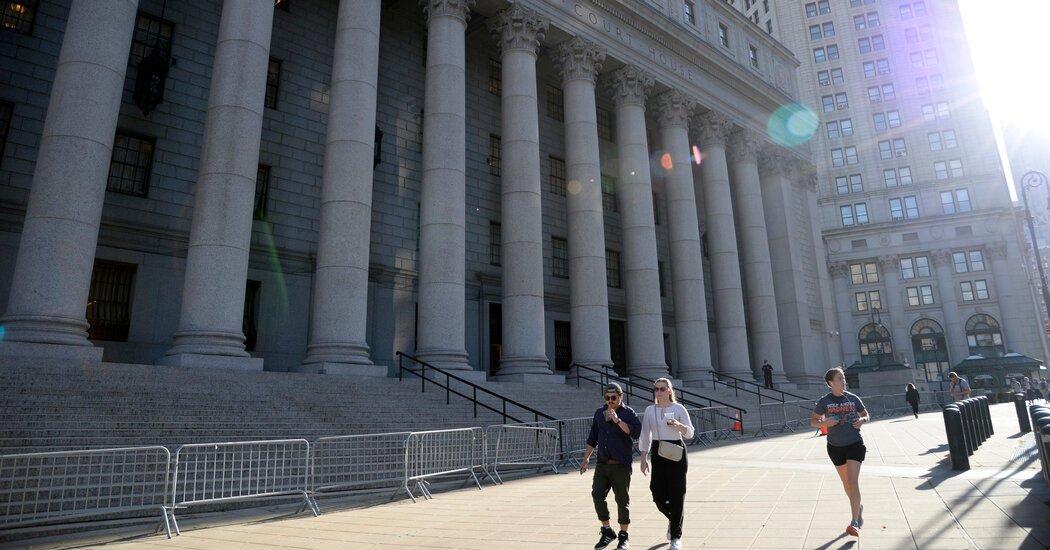A juror’s statements to the media in the wake of Ms. Maxwell’s conviction have raised the prospect that he lied during jury selection, casting doubt on the verdict.
For much of December, the 12 jurors arrived at a federal courthouse in Lower Manhattan and listened intently to harrowing testimony that Ghislaine Maxwell had helped the disgraced financier Jeffrey Epstein recruit, groom and sexually abuse underage girls.
And on Dec. 29, after finding Ms. Maxwell, 60, guilty of five of the six counts she faced, the jurors were sent home.
But on Tuesday morning, one of them, identified as Juror 50, is set to return to court, where he has been ordered to testify under oath about whether he lied about his background during the jury selection process.
The judge, Alison J. Nathan, has said she will question Juror 50 herself. Ms. Maxwell’s lawyers and prosecutors each were allowed to submit proposed questions in advance.
The unusual hearing was ordered by Judge Nathan after Ms. Maxwell’s lawyers, citing post-trial interviews by Juror 50 with several news outlets, asked the judge to throw out the verdict and grant Ms. Maxwell a new trial.
Understand the Ghislaine Maxwell Trial
- The Verdict: A jury found Ms. Maxwell guilty of aiding Jeffrey Epstein’s sexual abuse in a trial that was widely seen as the courtroom reckoning that he never had.
- Epstein’s Shadow: The disgraced financier loomed large, and his bond with Ms. Maxwell was at the center of the case.
- The Accusers: Four women detailed how Ms. Maxwell ensnared and manipulated young girls, leading to years of abuse.
- A New Trial?: A juror’s failure to disclose that he was sexually abused as a child has clouded the guilty verdict.
- Timeline of the Case: Here are some of the events that led to the highly anticipated trial.
Juror 50 revealed in the interviews that during the jury’s deliberations, he told other jurors that he had been the victim of childhood sexual abuse and did not report that abuse for years. In one interview, he said the jury room “went silent” as he related his story, and he said he helped other jurors understand things from a victim’s point of view.
But it was the response Juror 50 gave to a question in a screening questionnaire — administered by the court during the selection process — that has clouded the verdict. It asked whether prospective jurors had ever been the victim of sexual abuse.
Juror 50 checked a box answering “no.”
In seeking a new trial, Ms. Maxwell’s lawyers told the judge that Juror 50 “did not truthfully respond to perhaps the most important question put to potential jurors about their personal experiences — a question that pertained directly to the core allegations against Ms. Maxwell: whether they had been a victim of sexual assault or abuse.”
“Had Juror No. 50 told the truth,” her lawyers argued, “he would have been challenged, and excluded, for cause.”
In trying to assess the impact of disclosures inside the jury room, judges are barred from questioning jurors about what was said during deliberations. But a judge can look at statements jurors made during the jury selection phase.
“Following trial,” Judge Nathan wrote in an opinion last month, “Juror 50 made several direct, unambiguous statements to multiple media outlets about his own experience that do not pertain to jury deliberations and that cast doubt on the accuracy of his responses” in jury selection.
The statements were “clear, strong, substantial and incontrovertible evidence” that an impropriety had occurred — “namely, a false statement during jury selection,” the judge said.
She noted that the potential impropriety was not that a juror with a history of sexual abuse might have served on the jury.
“Rather,” she wrote, “it is the potential failure to respond truthfully to questions during the jury selection process that asked for that material information so that any potential bias could be explored.”
Documents made public last week in Federal District Court show that Juror 50 is expected to testify with a grant of immunity from prosecution.
His lawyer, Todd A. Spodek, had written to the judge that Juror 50 planned to “invoke his Fifth Amendment privilege against self-incrimination at the hearing.”
On Monday evening, the office of Damian Williams, the U.S. attorney for the Southern District of New York, filed an application with Judge Nathan, saying it had received Justice Department approval to seek an order compelling Juror 50’s testimony at the hearing and granting him immunity from prosecution in exchange.


























